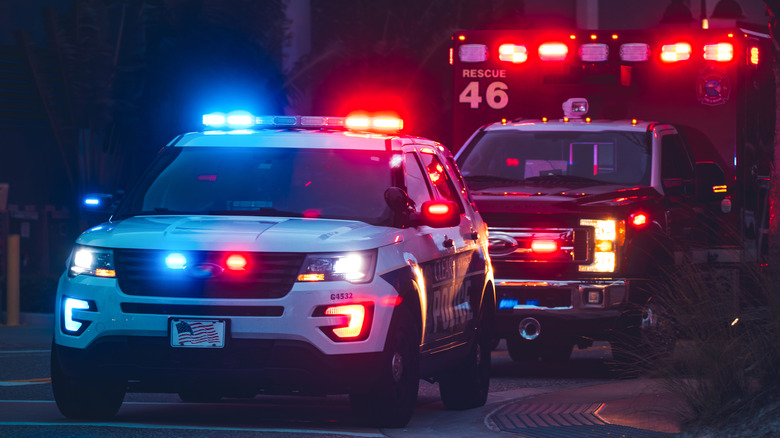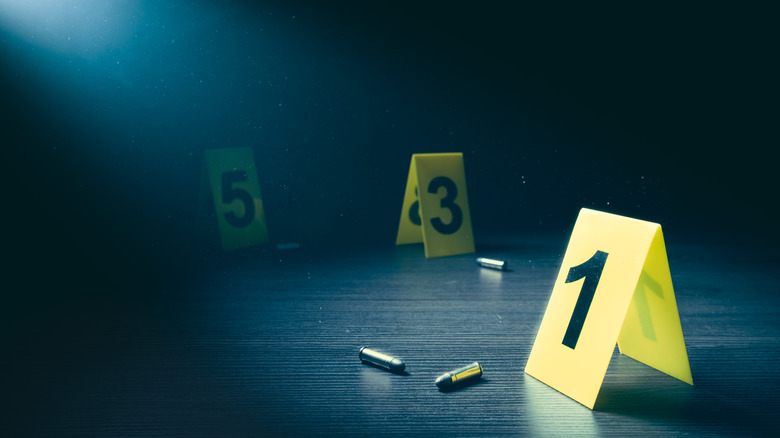Inside The Acquittal Of Philip Brailsford In Daniel Shaver's Shooting Death
On the evening of January 18, 2016, authorities were called to the La Quinta Inn in Mesa, Arizona, for reports of a man pointing a rifle out of the fifth-floor window of a hotel room. As reported by ABC 15, witnesses said the man was aiming the gun toward the pool area, where two people were swimming.
When authorities arrived on the scene, they went to the man's room, knocked on the door, and asked him to come into the hallway. The man, who was later identified as 26-year-old Daniel Shaver, exited the room with a woman. It was later revealed he met the woman in the hotel elevator and invited her back to his room.
WRTV reports the officers told Shaver and the woman to get on their knees and crawl toward them. The woman complied with the officers and was not injured in the incident. However, Shaver was ultimately shot and killed by then-officer Philip Brailsford — who said Shaver refused to comply with his orders.
According to AZ Central, Shaver was on his knees crawling toward the officers when he stopped and placed his hands behind his back. The officers told him to put his hands in the air. One officer warned Shaver that if he did not comply, he would be shot. In video footage, which was recovered from the officers' body cameras, Shaver was crying and begging, "Please don't shoot me."
Shaver was shot and killed when he reached toward his waistband
Daniel Shaver continued crawling on hands and knees toward the officers, according to AZ Central. However, when he reached back toward his waistband, former officer Philip Brailsford shot him five times. Shaver was pronounced dead at the scene.
Following the shooting, police searched Shaver and learned he was unarmed. Authorities eventually determined he was likely attempting to pull up his shorts, which were falling down as he crawled. A subsequent search of Shaver's hotel room revealed the gun he was seen pointing out the window was a pellet gun, which he used to kill vermin for his job at a pest control company.
Although he was accused of using excessive force against an unarmed suspect, Brailsford insisted the shooting was justified. According to AZ Central, Brailsford said, "I thought he was reaching for a weapon, and I thought someone was going to get shot."
WRTV reports prosecutors ultimately determined the shooting was not justified and Brailsford was subsequently charged with second-degree murder. If convicted, he faced up to 25 years in prison.
Brailsford was terminated by the Mesa Police Department amid the charges, according to CNN. His dismissal was also related to an engraving on the gun that was used to kill Shaver, that read: "You're f******."
Brailsford was acquitted
The trial, which lasted six weeks, included witness testimony and cross-examination of Philip Brailsford, according to CNN. The former police officer was ultimately acquitted.
Critics have argued that Daniel Shaver's shooting was not justified and Brailsford used excessive force. According to Newsweek, Brailsford had a history of using excessive force. In 2015, Brailsford was involved in an incident at a convenience store –- which was filmed by one of the store's clerks.
In the video, Brailsford can be seen pushing a teenage boy against a shelf and placing him in a headlock before throwing him to the floor. Two other teens, who were with Brailsford, were restrained by other officers and one can be heard screaming, "I can't breathe."
The clerk said the teens, who were between the ages of 16 and 19, " ... weren't doing anything" wrong and he was "absolutely terrified" about the way the police treated them. Newsweek reports Mesa Police Department spokesman Steve Berry confirmed the incident at the convenience store was "looked at" and Brailsford and the others were "administratively cleared."
The case remains controversial
According to an editorial in the Washington Examiner, national security writer Tom Rogan said the jury made the correct decision in acquitting Philip Brailsford in Daniel Shaver's death. Rogan said the initial call to authorities claimed "Shaver was armed and dangerous," and the officers should proceed with caution. Because the officers were told he was armed, they were concerned that Shaver was reaching for a gun. Shaver's failure to comply with the officers' demands only made matters worse, according to Rogan.
As Rogan explains, the prosecution needed to "prove that Brailsford acted maliciously" to secure a conviction on the charge of second-degree murder. However, Brailsford's defense team argued that he followed protocol and was convinced Shaver's behavior constituted an imminent threat.
Rogan said that based on the facts presented in the case, Brailsford was not guilty and his use of force was justified and reasonable. He also said if Brailsford were convicted, the conviction would have likely been overturned on appeal.
Shaver's widow said Brailsford should have been found guilty
Daniel Shaver's widow, Laney Sweet, said her husband's death "was an execution." During an interview with CBS News, Sweet pointed to the footage from the officers' body cams and said, "You had a man begging for his life, and he was shot five times for what? For his elbow coming up too high? For being confused? For being compliant? Why did he deserve to die? He didn't." Sweet said the video should have provided the jury with enough evidence to find Brailsford guilty. She also blamed the Mesa Police Department for training officers to shoot suspects without thoroughly assessing the situation.
A 2017 ACLU blog post written by Jeffery Robinson, director of The Who We Are Project, also questioned training as an excuse for the shooting. "The police are screaming that the cost of a mistake is death — what kind of training teaches that as a proper way to deal with people?" Robinson wrote.
Although Brailsford was fired from the Mesa Police Department prior to his acquittal, he was rehired so he could retire in good standing and receive his pension. As reported by ABC 15, the arrangement included an agreement that Brailsford would not be eligible to perform any actual work for the police department during the brief period he was rehired. He also would not be paid for that time. He was ultimately granted a medical retirement and will receive an accidental disability pension.




